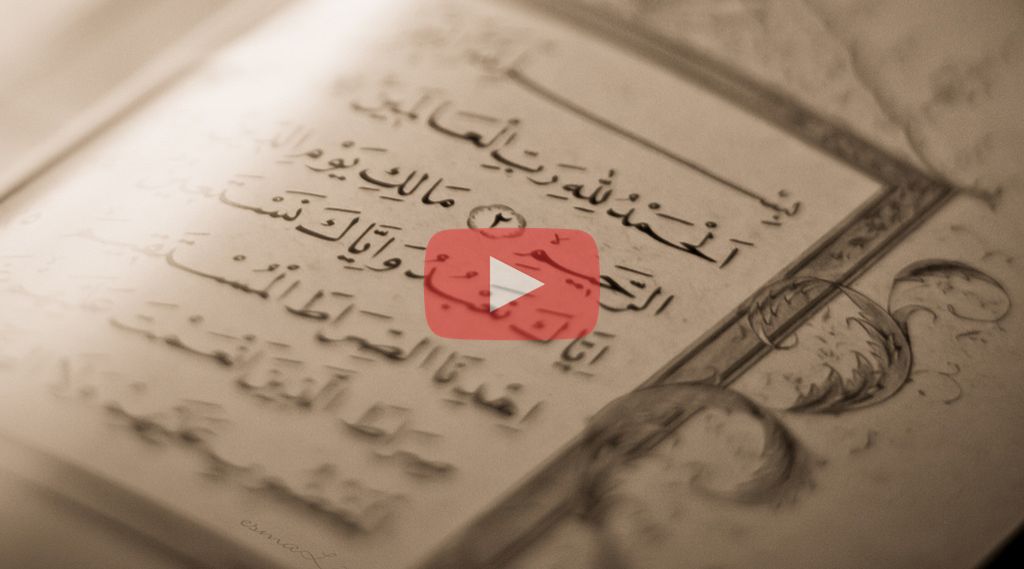Part 1 | Part 2
Editor’s Note: How to achieve a rich and interactive experience of the Quran recitation that gets your inner self involved? The author continues in this part his discussion of the steps to reach that ambitious goal.
Hearing from Allah
Third: Say to yourself: I am hearing from Allah.
As a part of your effort to involve your inner self, you should try to think as if you are hearing the Quran from the Sender himself.
The Quran is the speech of Allah. For, just as you cannot see Him while He is always with you, you cannot hear Him while it is He who is speaking.
Let the printed words and reciter’s voices therefore recede and allow yourself to move nearer to the Speaker. This feeling will be generated and greatly strengthened as your consciousness of ‘being in His presence’ continues to grow.
Al-Ghazali, in his Ihya’, tells about a person who said:
I read the Quran but did not find sweetness in it. Then I read it as if I was hearing it from the Prophet (peace and blessings be upon him) while he was reciting it to his Companions.
Then, I moved a stage further and read the Quran as if I was hearing it from Jibreel while he delivered it to the Prophet (peace and blessings be upon him).
Then Allah brought me to a further stage and I began to read it as if I was hearing it from the Speaker.
Such feeling will imbue you with a delight and sweetness that will make your inner self fully enveloped by the Quran.
Allah’s Direct Address
Fourth: Say to yourself: Allah addresses me directly, through His Messenger, when I read the Quran.
No doubt the Quran was sent down at a specific point in history, and you have received it indirectly through persons, time and space. But the Quran is the word of the Ever-living Allah, it is eternally valid and it addresses every person.
So let all these intermediaries recede for a while and allow yourself to read the Quran as if it is talking directly to you, as an individual and as a member of a collectivity, in your time. The very thought of such direct reception will keep your heart seized by what you are reading.
Every Word for You
Fifth: Say to yourself: Every word in the Quran is meant for me.
If the Quran is eternally valid, and if it is addressing you today, then you must take every message as something which is totally and urgently relevant to your life and concerns, whether it be a value or norm, a statement or piece of knowledge, a character or dialogue, a promise or a warning, a command or a prohibition.
Such understanding will make your Quran reading alive, dynamic and meaningful. There may be some problems in translating messages intended for persons who look so different from you into messages relevant to your person and concerns, but with sincere and right effort it should be possible.
Conversation with Allah
Sixth: Say to yourself: I am conversing with Allah when I am reading the Quran.
The Quran contains Allah’s words, addressed to you and meant for you. Though those words are on your lips and inscribed on your heart, they are yet a dialogue between Allah and man, between Him and you. This dialogue takes many forms. It may be explicit or it may be implicit in the sense that a response is implied from you or Him.
How does this implicit conversation take place? A beautiful example has been given by the Prophet (peace and blessings be upon him) in a Hadith qudsi:
“I have divided the Prayer (salah) between Me and My servant, half is for Me and half for him, and My servant shall have what he asks for.
For when the servant says [All praise belongs to Allah, the Lord of all the worlds}, Allah says, ‘My servant has praised Me’.
When the servant says, {The Most-merciful, the Mercy-giving}, Allah says, ‘My servant has extolled Me’.
When the servant says {Master of the Day of Judgement}, Allah says ‘My servant has glorified Me.’
When he says, {Thee alone we worship and from Thee alone we seek help}, He says, ‘This is shared by Me and My servant. He will be given what he will ask.’
When he says, {Guide us on the Straight Path, , the path of those to whom Thou hast been Gracious not of those who have incurred Thy displeasure, nor of those who have gone astray}, He says ‘This is for My servant, and My servant shall have what he has asked for” (Muslim, At-Tirmidhi, Ahmad) .
You will see later how the Prophet (peace and blessings be upon him) used to respond with words to the message and content of various verses. Remaining conscious of thus conversing with your Creator and Master will impart an extraordinary quality of intensity and depth to your Quran reading.
Trusting and Expecting Allah’s Rewards
Seventh: Say to yourself: Allah will surely give me all the rewards He has promised me through His Messenger for reading the Quran and following it.
Many rewards are promised in the Quran. Assured are the spiritual gifts in life, such as guidance, mercy, knowledge, wisdom, healing, remembrance and light, as well as worldly favours such as honour and dignity, well-being and prosperity, success and victory.
Eternal blessings such as forgiveness (maghfirah), Paradise (Jannah) and Allah’s good pleasure (ridwan), too, are reserved for the followers of the Quran.
The Prophet (peace and blessings be upon him) has told about many more rewards. Take any standard Hadith collection like Bukhari, Muslim, Mishkat or Riyad As-Salihin, read the relevant chapters concerning the Quran, and you will find them there. Some of them you will find in this book as well, especially at the end.
For example:
“The best among you is the one who learns the Quran and teaches it” (Bukhari)
“Read the Quran, for on the Day of Resurrection it will come interceding for its companions”(Muslim).
“On the Day of Resurrection, the companion of the Quran will be told: Read the Quran and ascend (in ranks, and recite (the Quran) as you used to do in the world for you will reach your (highest) rank at the last verse you read” (Abd Dawud).
“Whoever reads one letter of the Quran shall receive a hasanah, i.e. a good deed, [that will be multiplied to become] equall to ten similar hasanat (good deeds)” (At-Tirmidhi)
Store as many of these promises as you can in your memory and recollect whatever you find relevant, whenever you can. Trust, expect, and seek from Allah their fulfillment in your case.
Observance of such a measure, out of belief in Allah and seeking His reward, greatly enhances the inner value of your deeds. One Hadith tells that there are forty virtues. If a person performs any of these, hoping for the reward and trusting in the promise, Allah will admit him to Paradise; the highest of these virtues is as little as making a gift of some milk to one’s neighbour (Al-Bukhari).
References
Taken with slight modifications from the Author’s Way to The Quran


